//Food ready, a hungry line of guests fill their plates with food prepared by Shanae Adams and Briannah Hill. Adams is the co-founder of The Chrysalis House, which organized the Juneteenth Jubilee and Cookout at Tooey’s Off Colfax on June 19. Photos by Esteban Fernandez | [email protected]
This past weekend, the people of Denver came together to mark the 156th celebration of Juneteenth. For the first time, the day was celebrated as a national holiday after President Joe Biden signed the Juneteenth National Independence Day Act into law on June 17.
Juneteenth—also known as Freedom Day or Jubilee Day—commemorates the day federal troops arrived in Galveston, Texas on June 19, 1865, and informed enslaved people of their freedom under the terms of the Emancipation Proclamation. The notice came two and half years after President Abraham Lincoln had signed it, freeing the enslaved within rebellious states.
Today, Denver has one of the largest Juneteenth celebrations in the country. This is largely thanks to Denver businessman Otha P. Rice, who was born in Texas and moved to the Colorado capitol when he was a child. By 1953 he had established himself as a central figure in Five Points where he held Denver’s inaugural Juneteenth celebration. Last year, the official Juneteenth parade was virtual. But the celebration was back in full swing this year in the Five Points and Whittier neighborhoods.
In addition to the larger parade and music festival, smaller events such as the Juneteenth Jubilee and Cookout held at Tooey’s Off Colfax also honored the holiday. Revelers enjoyed a cookout and showcase of local talent, with everything from poetry readings and comedy to burlesque and drag. Hosted by The Chrysalis House, the event was an opportunity to flaunt melanated magic; a cabaret show where “aggressive Black joy” and freedom and its many aspects could be shared.
Photos below by Esteban Fernandez.
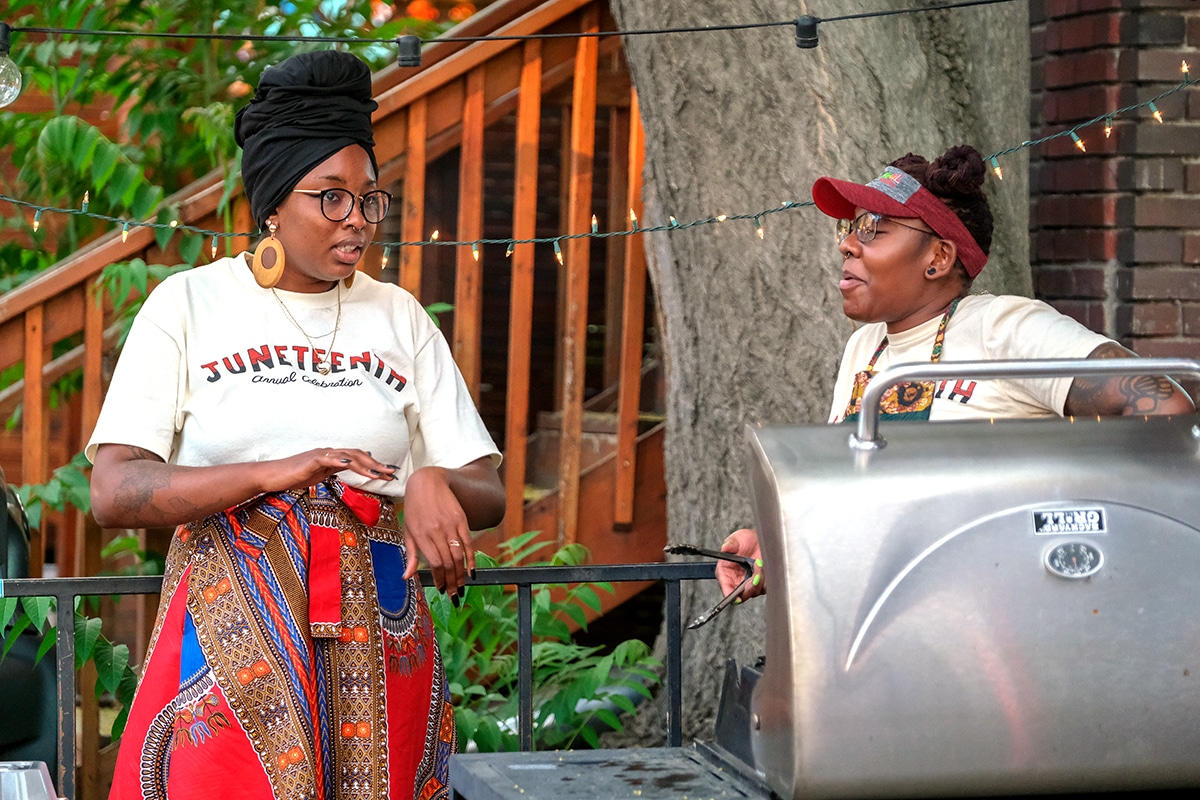
//Briannah Hill and their partner, Shanae Adams, share a moment while grilling burgers, hotdogs and chicken for guests at the Juneteenth Jubilee and Cookout at Tooey’s Off Colfax on June 19. Adams is the co-founder of Chrysalis House and co-organized the event.
Becky Taha’Blu, a fellow co-founder of The Chrysalis House and co-organizer of the event, said the group put together the cookout and cabaret to center the Black queer and sex worker communities.
“The whole reason why is to celebrate Juneteenth,” Taha’Blu said. “As you know, it’s now a federal holiday, so it’s just like doubling down on the unapologetically aggressive Black joy. And that’s what we wanted to facilitate here tonight is just a stage for folks that are queer, Black and fabulous.”
Taha’Blu noted that not all of the performers were queer or sex workers, but all belong to the Black community.
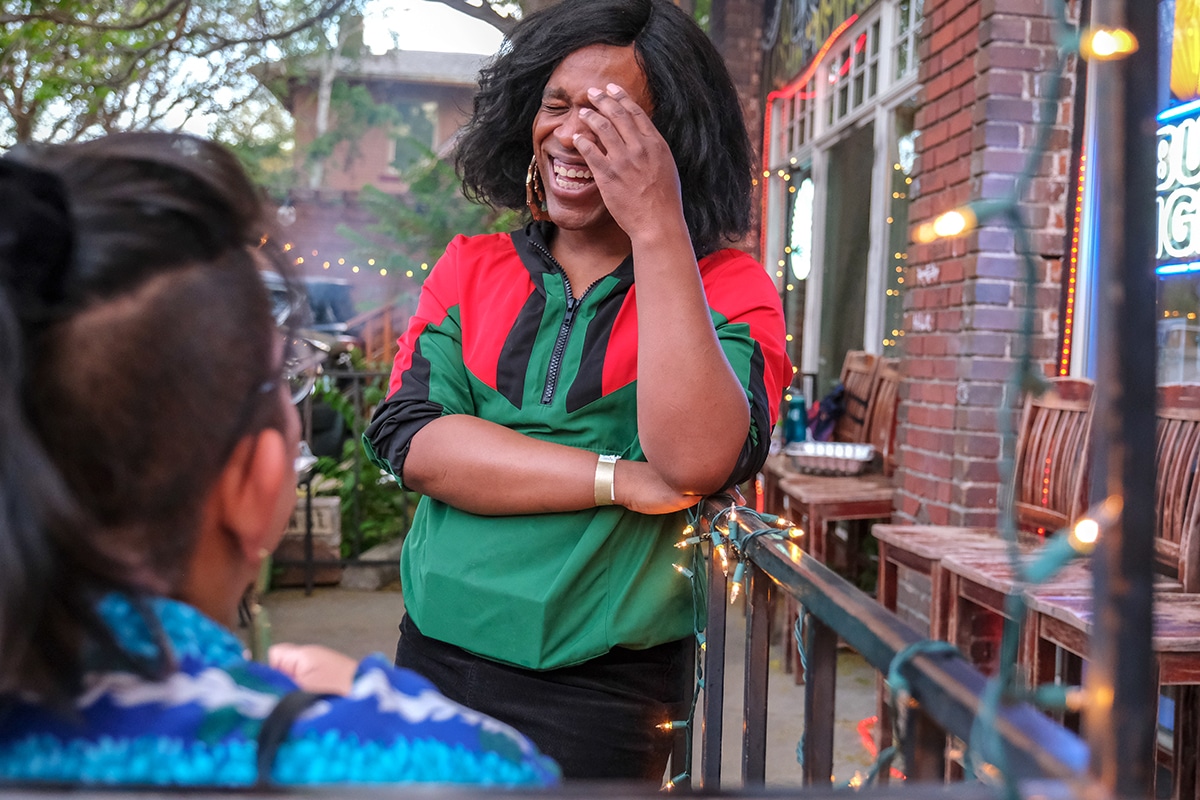
//Lunae Chrysanta shares a laugh with Chavi Mackey at the Juneteenth Jubilee. Guests enjoyed the warm weather outside while the grill sizzled nearby, while others watched the cabaret performances inside the venue. Among the performers was Melanated Menagerie co-founder ALLurr’em Velv’IT, who performed a burlesque dance titled “Exposed,” that was set to Lizzo’s “My Skin.”
Velv’IT said the act was a way of appreciating herself as a Black woman and showing the rest of the world how to love her.
When she was younger, Velv’IT said she felt disconnected from Juneteenth. But as she grew older and discovered more about herself and her heritage, the holiday became something she felt she needed to take part in.
“I just realized that aspect of freedom that we are still struggling to achieve,” Velv’IT said. “My acts of resistance every day is me living as a happy, queer Black woman and living in my existence and just expressing that to everyone that I can. So I feel like that is my mission in life, is to spread love and just say, ‘Hey, we’re here. We ain’t going nowhere. We built this country; give us the freedom that we deserve.’ And so it’s every year, it’s just kind of pushing and celebrating that mission.”
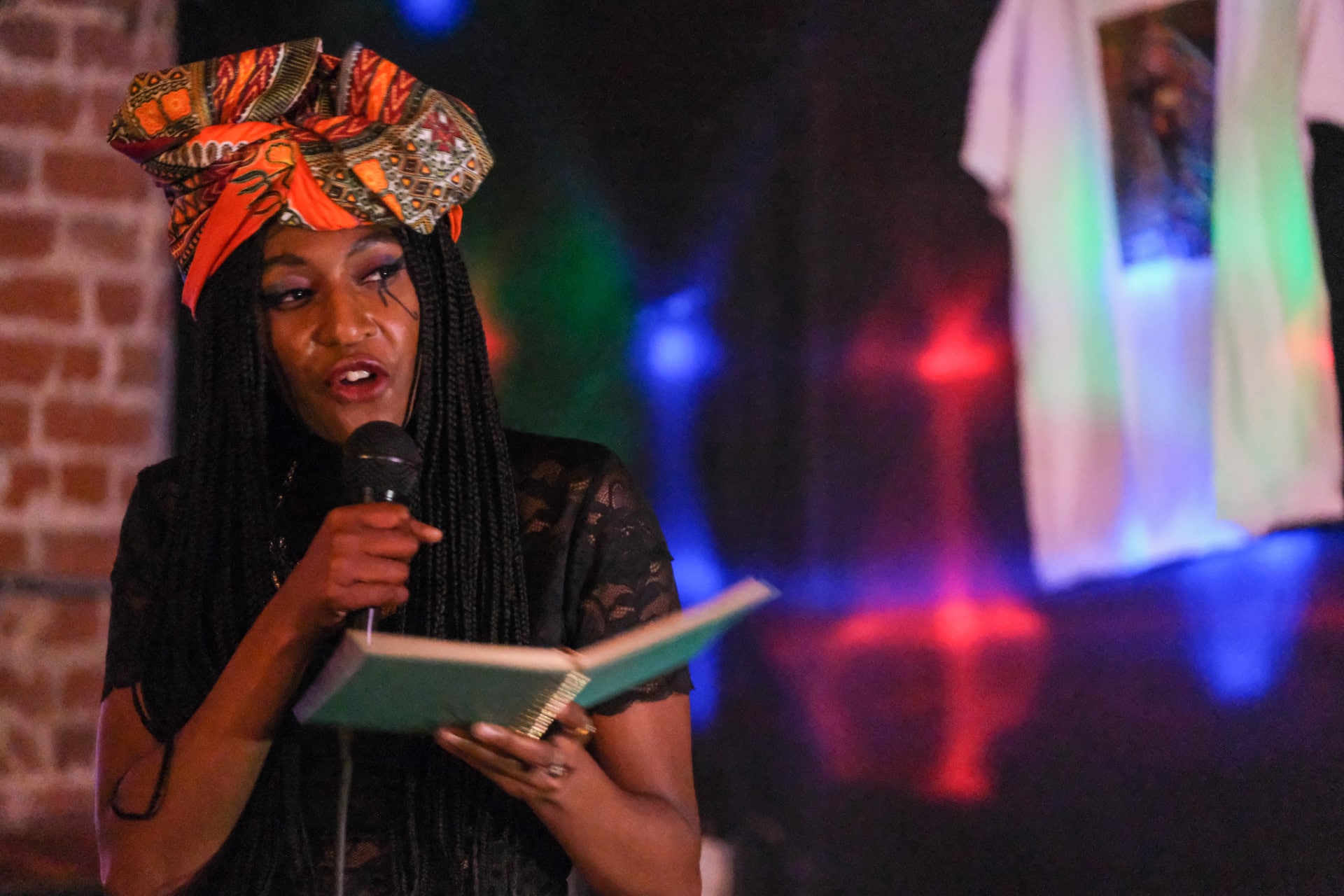
//Asya Toney reads her poem about Sarah Baartman to the audience gathered for the Juneteenth Jubilee and Cookout at Tooey’s Off Colfax on June 19.
Toney read an untitled piece about Sarah Baartman, a South African Khoikhoi woman. Baartman was exhibited as a freak show attraction in 19th century Europe, as white Europeans were infatuated by her full figure. Her body became the foundation of the over-sexualization of Black women and was used to justify scientific racism.
Toney’s poem is one aspect of how she celebrates Juneteenth—by educating people about lesser-known Black historical figures and their influence on culture today.
“[Juneteenth] is more about the joy and the celebration of freedom and knowing that there are no more literal shackles holding back our ancestors,” Toney said. “I like to celebrate by just being unapologetically Black all month long and doing what I can to help other people and educate other people in a [constructive] way.”
In regards to Juneteenth officially being recognized as a federal holiday, Toney said it was about time. She mentioned that everyone should have the day off to reflect on the day’s significance and what it means to them as an American.
“I think that if white people were slaves and they had an independence, they would celebrate it,” Toney said. “And they do, it’s called Fourth of July. So I think that it’s ridiculous that the actual Black independence wouldn’t be a national holiday. Especially considering this country was built by Black people, it was built by slaves. We have every right to have it be a national holiday and to take time off of work.”
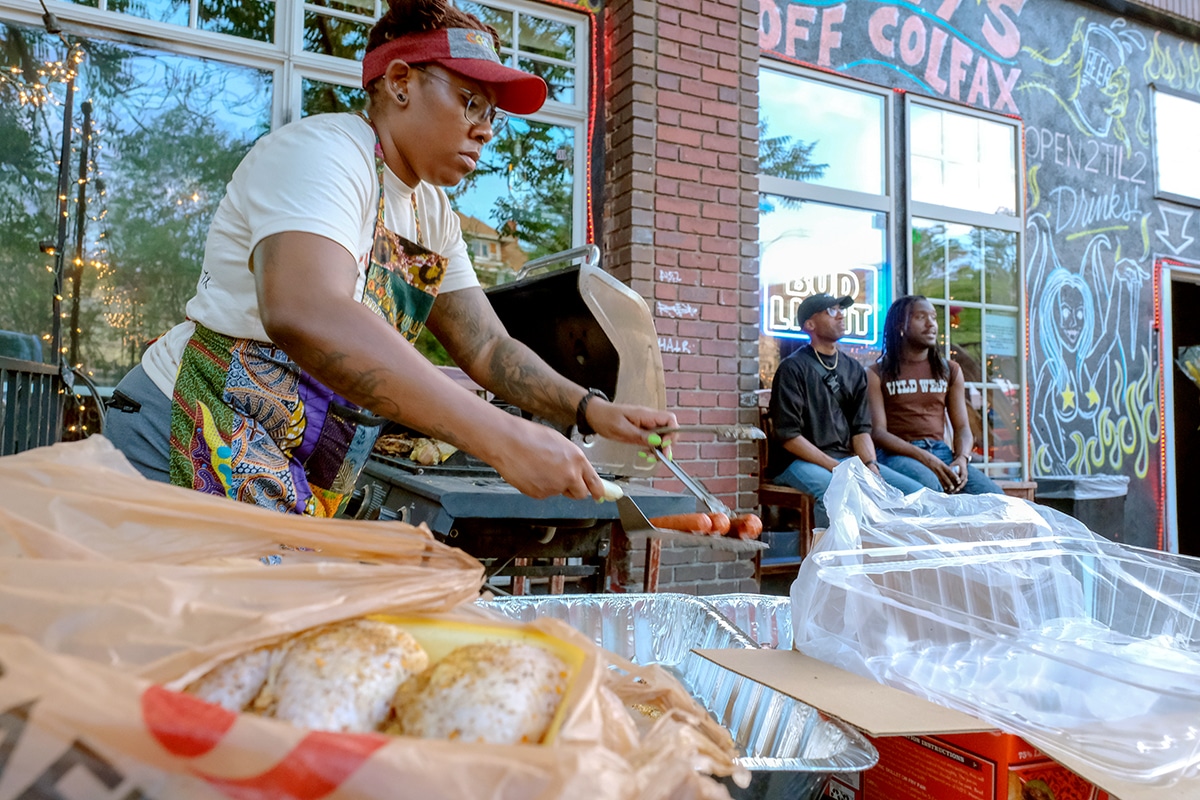
//Shanae Adams piles cooked hot dogs into one of the aluminum trays for serving guests at the Juneteenth cookout.
When asked about how white and non-Black people of color can honor the Juneteenth holiday, all interviewees said the best way is to pay the Black folks in your life personal reparations and support Black businesses and artists.
“Before you post that hashtag on social media, make sure you’ve sent some money or some support to a Black individual that you know,” Velv’IT said. “Everyone has that one Black friend; send them a little cash today. Let them know that you appreciate them.”
Every interviewee also mentioned that while the federal holiday status is appreciated, it’s far from the policies and practices that thousands took to the streets last summer to demand.
“It’s definitely not enough,” said event emcee Tairee Dillard. “This isn’t what we asked for. I mean, it’s great, but it’s also like, this isn’t everything.”
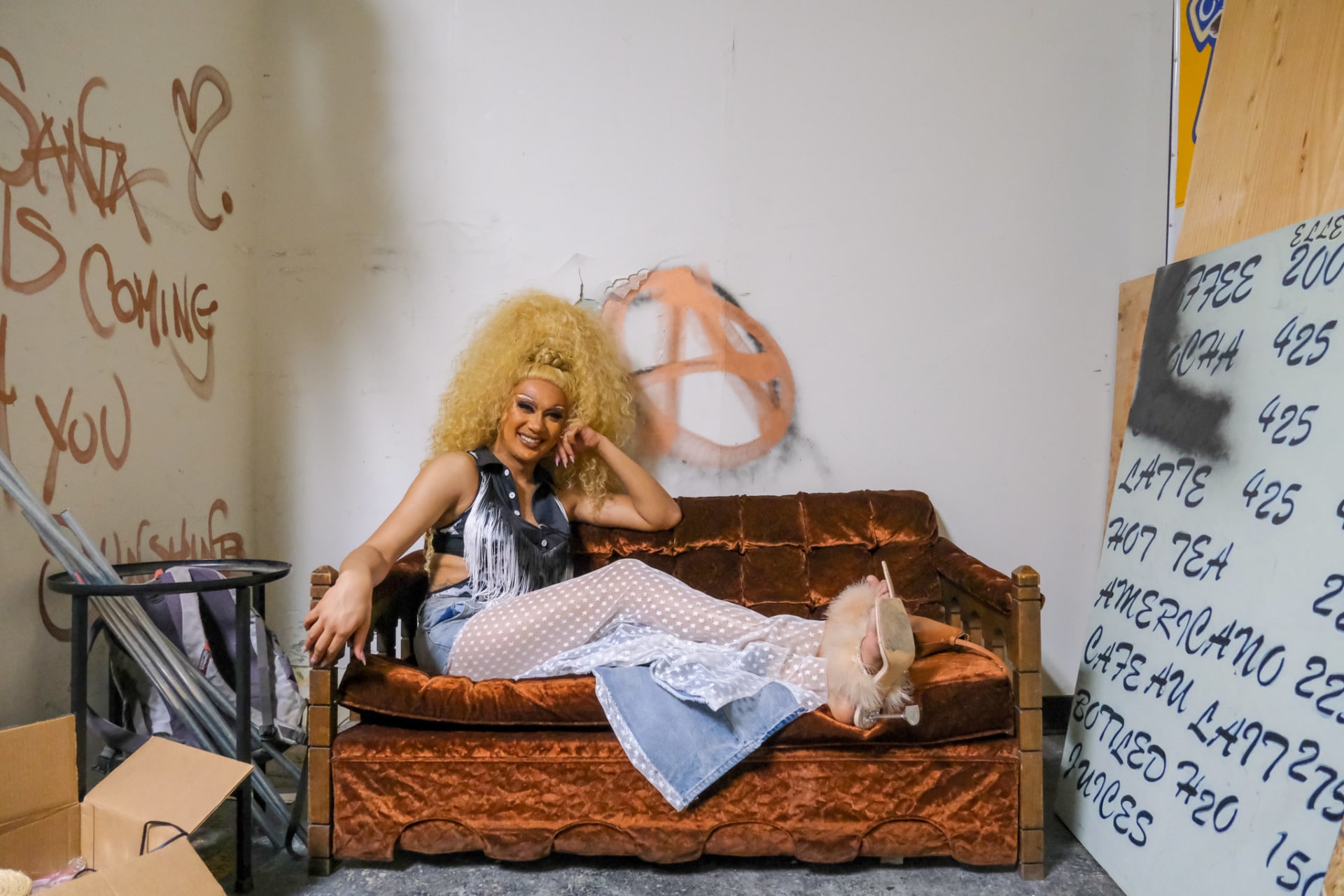
//Mikki Miraj lounges on a sofa inside the green room at Tooey’s Off Colfax after completing her performance routine for the Juneteenth Jubilee and Cookout on June 19.
As the show drew to a close, Mikki Miraj began the ritual of removing her makeup in the green room. She said for her, the holiday was a mid-year reminder of the importance of Black history. She said Black History Month draws out a lot of emotions that are punctuated on Juneteenth. But Miraj also said she personally wasn’t an advocate for the holiday being nationally recognized. Miraj said she feels that she doesn’t need an official holiday to honor the Black community.
“Any excuse or chance to celebrate Blackness, I will happily take and be a part of, because I like to do that,” Miraj said. “I just try to carry myself with grace and create space for others wherever I go all day, every day. Every day is a holiday.”
The significance of Juneteenth taking place during Pride Month wasn’t lost on the guests or the organizers. Racism plays a role in the relationships between white and Black queer people year-round, but it’s especially poignant during this time of the year. Although Pride Month is a recognition of the contribution of Black and brown trans women to the fight for equal treatment, many argue the movement and celebration have become white-washed.
“Honestly, I think that the queer community has been rather removed because they’re dealing with their own oppression,” Miraj said. “White queer people specifically don’t oftentimes find time or create time to empathize with people who go through experiences different than theirs in terms of race because they’re so focused on their own oppression, which is valid. I don’t know that [the queer community] has made a large contribution or a large detraction from the [movement for racial equity]. The movement exists outside of the queer spectrum.”
Did you enjoy these photos? Help us keep the lights on! Supporting local press ensures the stories you want to read keep coming, become a member for free today! Click here.

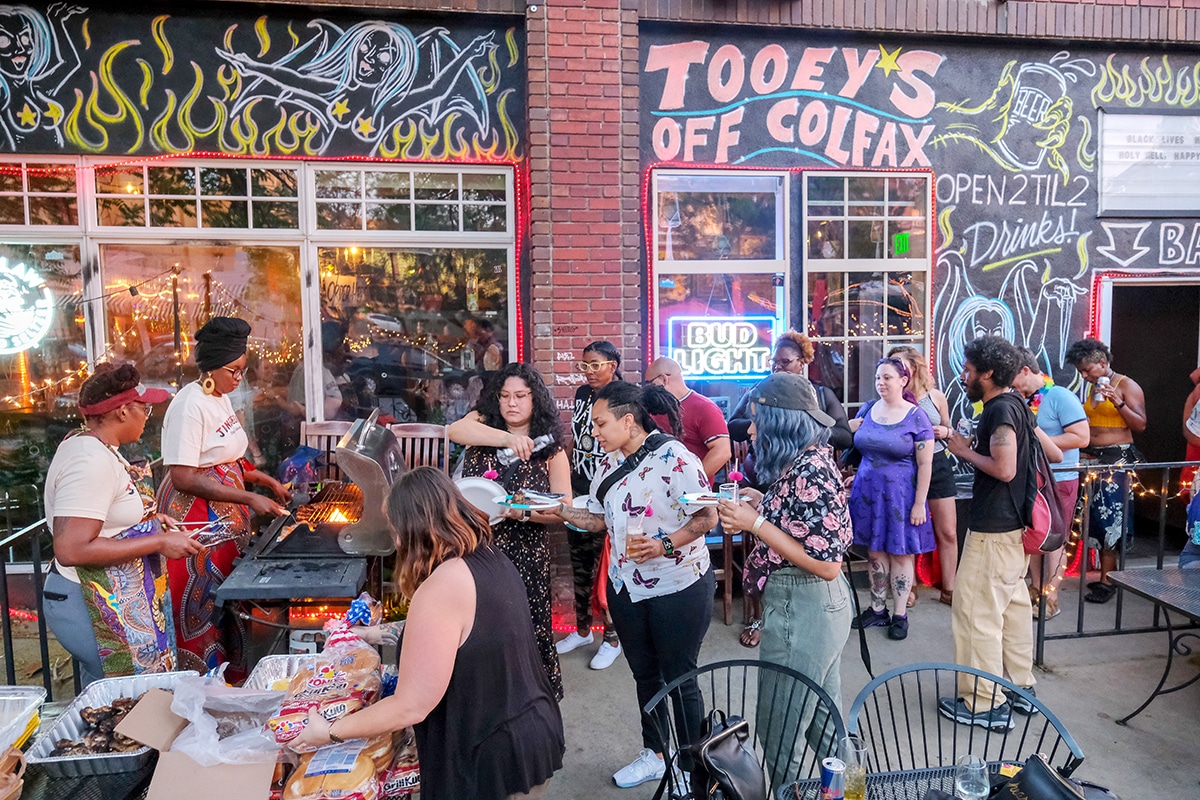

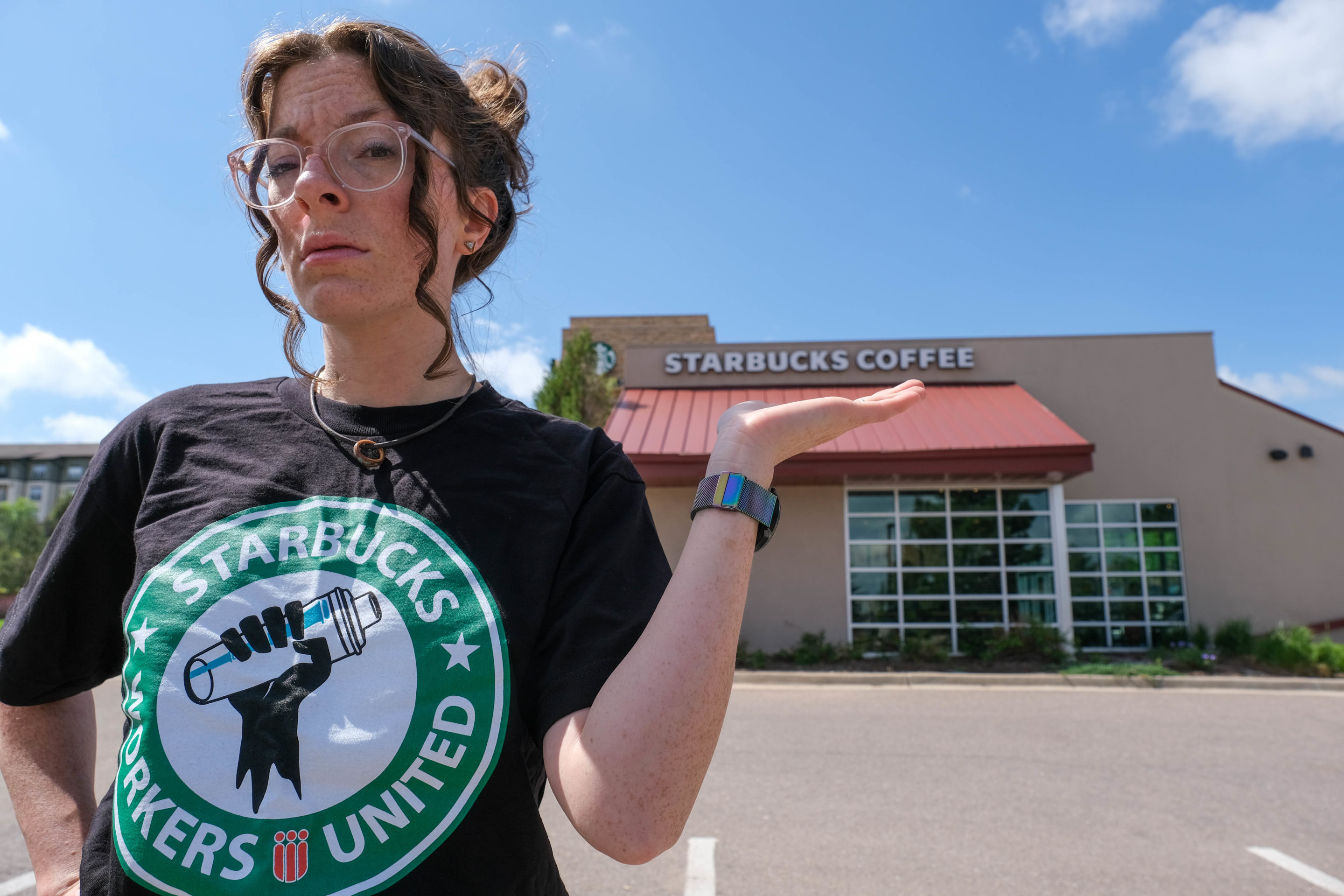
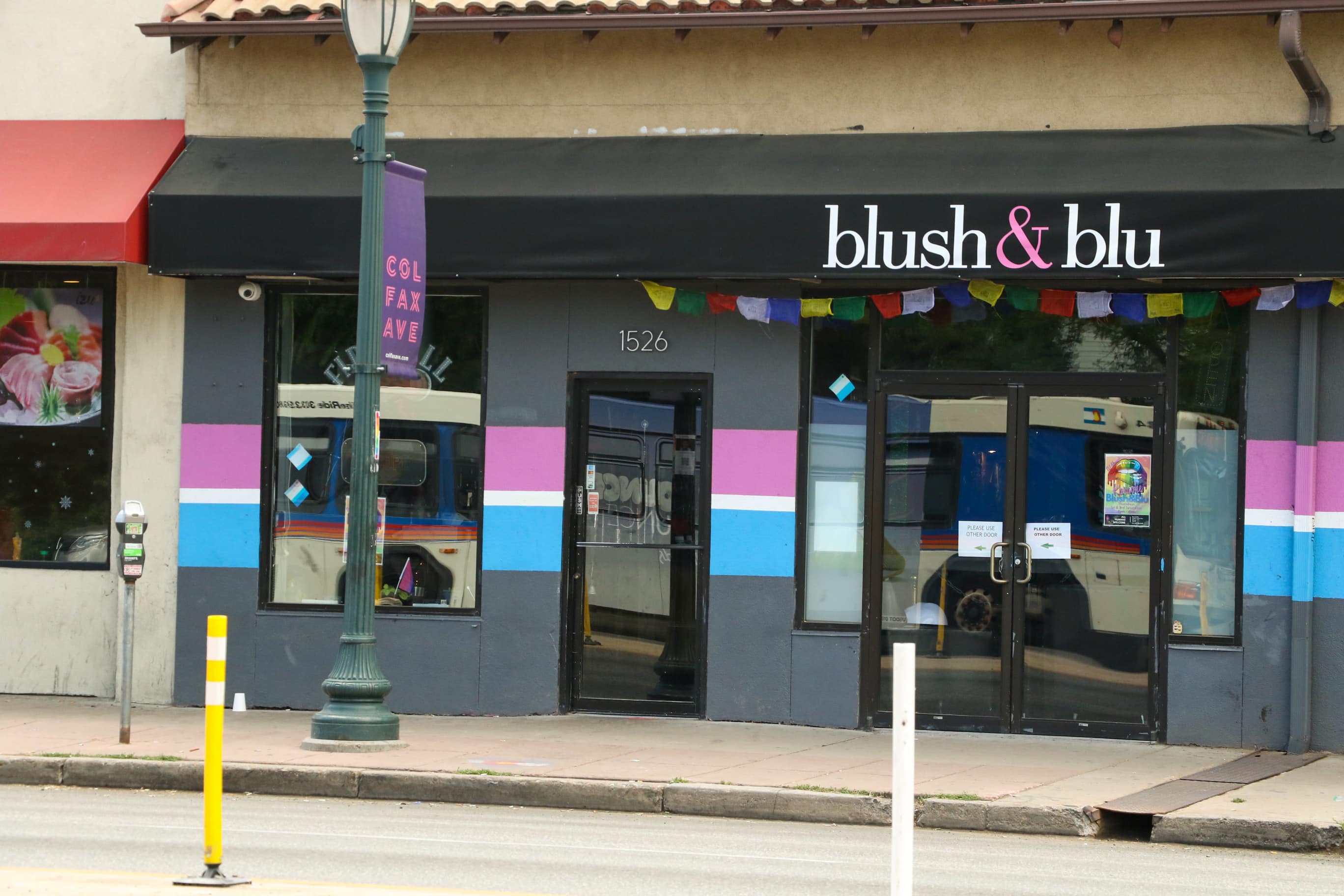
0 Comments